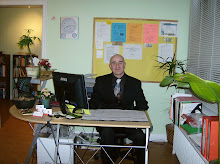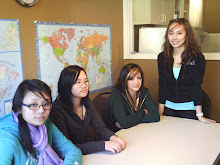Every week, I browse the internet for articles that can be used as an introduction to a topic for conversation. The articles need to be short, because we want to spend most of our time discussing them and not reading them. They also need to be fairly easy because we get people with a wide range of English levels at each meeting.
Once I've chosen three or four articles, I go through them highlighting vocabulary I think might be unknown to some of our attendees. I also look for a grammatical item to explain, and underline all the examples of it.
During the meeting, each of the attendees takes turns reading sections of the articles while I correct pronunciation. We then explain all the highlighted vocabulary and any other words or phrases people ask about. After that, we discuss the topic of the article. Finally, before moving to the next article, I do a brief lesson on the grammatical item.
In tonight's meeting, we will be discussing articles dealing with where people's names came from, unusual fashion, friends with bad habits, and stupid criminals.
For example, here is the article on names, which I took from the City TV News website. Unfortunately, I can't highlight the vocabulary or underline the grammar here, so I've changed the text colour of the vocabulary to blue, and the grammar to purple:
Man Offers Naming Rights For His First Born Son For Free Gas
Monday July 14, 2008
CityNews.ca Staff
Monday July 14, 2008
CityNews.ca Staff
Many people are proud of the stories behind their names. Some have been named after an interesting relative, literary figure or a word with special significance in another language.
One Florida boy may not be so keen on sharing the tale behind his name when he grows up.
David Partin agreed to name his unborn son after two morning radio show hosts to get some free gas.
The radio hosts offered a gasoline gift card to a listener with the most interesting offer to trade. Partin called in and agreed to name his child after the radio personalities Richard Dixon and J. Willoughby. The child's full first name will be Dixon and Willoughby - yes, the "and" is included.
The baby is due this winter.
Dixon and Willoughby - the radio hosts - said they'll hand over the voucher for free gas when they see the birth certificate.
Perhaps Partin and his expectant girlfriend could try this stunt if they plan to have a second child. Pampers Partin has a nice ring to it.
http://www.citynews.ca/news/features_24744.aspx?&categoryurl=http://www.citynews.ca/news/features_690.aspx
One Florida boy may not be so keen on sharing the tale behind his name when he grows up.
David Partin agreed to name his unborn son after two morning radio show hosts to get some free gas.
The radio hosts offered a gasoline gift card to a listener with the most interesting offer to trade. Partin called in and agreed to name his child after the radio personalities Richard Dixon and J. Willoughby. The child's full first name will be Dixon and Willoughby - yes, the "and" is included.
The baby is due this winter.
Dixon and Willoughby - the radio hosts - said they'll hand over the voucher for free gas when they see the birth certificate.
Perhaps Partin and his expectant girlfriend could try this stunt if they plan to have a second child. Pampers Partin has a nice ring to it.
http://www.citynews.ca/news/features_24744.aspx?&categoryurl=http://www.citynews.ca/news/features_690.aspx
.
Vocabulary:
Naming Rights = the ability to give a name to something (or somebody). We usually use this phrase when the rights are bought or traded. (eg. Rogers Centre)
behind = in this case, behind means the reason for (eg. Money is behind all my problems.)
named after = the source of a name (eg. I am named after my grandfather.)
literary figure = a character from a famous book or a famous writer (eg. Romeo, or Shakespeare)
significance = importance
be so keen on = to really like or enjoy something (eg. I'm keen on sports.)
gift card = a card which that lets the user buy things or services up to the set value of the card. For example, if I go to Future Shop and buy a $50 card which I give to my son, he can buy $50 worth of things at Future Shop.
personalities = people who are very good at something (eg. Tiger Woods is a famous golf personality.)Naming Rights = the ability to give a name to something (or somebody). We usually use this phrase when the rights are bought or traded. (eg. Rogers Centre)
behind = in this case, behind means the reason for (eg. Money is behind all my problems.)
named after = the source of a name (eg. I am named after my grandfather.)
literary figure = a character from a famous book or a famous writer (eg. Romeo, or Shakespeare)
significance = importance
be so keen on = to really like or enjoy something (eg. I'm keen on sports.)
gift card = a card which that lets the user buy things or services up to the set value of the card. For example, if I go to Future Shop and buy a $50 card which I give to my son, he can buy $50 worth of things at Future Shop.
due = expected to arrive. We also use this to describe when the mother is expected to have the baby. (eg. She is due in July / When are you due?)
hand over = to give up possession of something (eg. The police officer told the drunk driver to hand over his keys.)
voucher = a written, official promise, often for cash or goods. In this case it means the gift card.
birth certificate = An official record of the date and place a person was born. In Canada, it is made by the province after the hospital where the baby was born sends them the information.
expectant = pregnant / going to have a baby
stunt = something that is done to attract attention
Pampers = a brand of diapers (underwear for babies)
has a nice ring to it = sounds interesting or attractive (like the sound of a bell)
Grammar
Infinitive: “To + Basic Verb”
Infinitive: “To + Basic Verb”
The infinitive is often used like a noun, usually as the object of a verb. Eg. I decided to go. / I want to go.
However, some verbs use a gerund (verb + "ing") as an object (eg. I enjoy swimming.); so you have to memorize which verbs take infinitives and which take gerunds.
Infinitives can also be used as the subject of sentences, but that sounds old fashioned today, as in Shakespeare's "To be or not to be, that is the question." Nowadays, we usually use a gerund as a subject (eg. Studying is the most important thing.) Infinitives are more common as subject complements (eg. The most important thing is to study / It is important to study.)
Another use of infinitives is to explain the purpose of an action. (Notice the use of the infinitive as a subject complement in that sentence.) If I want to explain why I went to the bank, I can say, "I went to the bank to withdraw some money." This is really a shortened form of the more formal "in order to." (eg. I went to the bank in order to withdraw some money.)
You can get more information on infinitives here: http://owl.english.purdue.edu/owl/resource/627/03/



1 comment:
Cleaning the bathrooms*House cleaning in Madinah*Anti-bed bugs*Best colors bedrooms Modern*Apartment cleaning in Jizan*Furniture transfer in Jazan*Water leak detection in Jizan*An insect control in Hail*Cleaning houses in Hail*Moving furniture with a rope
Post a Comment